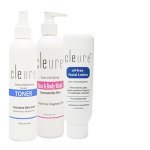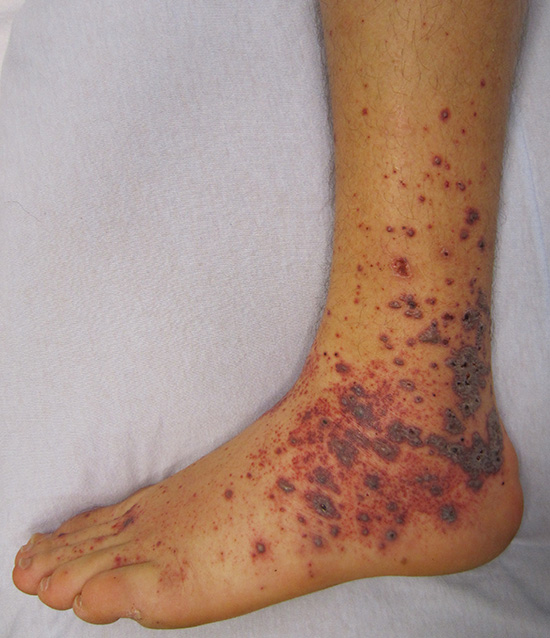Skin Boils and Cysts
By Any Other Name, a Boil is Still a Pain
Whether you call it a skin boil, a furuncle, or a skin abscess, it can be a real pain in the neck or the back or the shoulders or anywhere!
These pimples on steroids are typically very painful and, depending on what part of your body they decide to intrude upon, they can do a real number on your self esteem. In fact, you could say that having a skin boil is enough to make your blood boil!
What Causes Boils
A skin boil is basically an infection caused by bacteria and confined to a small area underneath your skin. The offending bacteria are most frequently staphylococcus aureus, or the new super sized version known as MRSA.
Actually, these bacteria are not uncommon; about a third of the population have the bacteria on their skin or in their nose, but many people never actually become infected.
The problem begins when the bacteria find a way to get into the cells beneath the surface of your skin, possibly by way of a hair follicle or an oil gland. This can happen when there is some sort of tiny break in the skin, an ingrown hair, or a splinter.
Once under the skin, the bacteria begin to reproduce, and the resulting bacterial colony is well on its way to making you miserable.
Now you have a skin boil. It starts out as a hard lump which can grow in size anywhere between a pea to a golf ball. The area is generally some shade of red, warm to the touch, and very painful.
Gradually, the boil softens as it develops a pocket of pus at the center, becoming larger and more painful. The good news is that, once it has reached this stage, it's almost ready to drain, and that means relief.
Boils and Cysts
A skin boil and a cyst, while they may seem to be somewhat similar, are not the same thing at all. While they are both lumpy imperfections of the skin, they really have little else in common.
For one thing, a cyst can manifest on many different parts of the body, including internal organs. Unlike a boil, it doesn't start out as an infection; it's a self contained sac like structure that may contain a fluid, some sort of semi solid substance, or even air.
There are several different causes for cysts; some are even present at birth.
Another way that a cyst differs from a skin boil is that it doesn't usually cause pain. If it does, it has probably ruptured or become infected, and you will need to see a doctor. Otherwise, depending on where it is located, it will probably never bother you.
Cysts, can hang around forever, or they can eventually just vanish. If you have a cyst that bothers you for any reason, it's not something you can take care of on your own. You'll need a medical professional to remove it surgically.
A boil, on the other hand, has a definite life cycle. If left alone, it will usually run its course, burst, and drain a process that can take anywhere from 10 to 25 days. Unfortunately, for anyone suffering with a skin boil, that may be 10 to 25 days too long. For those people, there are some treatment options that may hasten the process along.
How To Treat A Boil
The most important thing to remember, and probably the hardest advice to follow, is NEVER squeeze a boil.
This can result in compromising the surrounding skin cells, making it possible for the infection to enter the bloodstream and travel to other skin cells or even other parts of your body.
To avoid possible disastrous consequences caused by squeezing, there is a kinder, gentler approach to hasten the demise of a skin boil.
For best results, begin treatment at the first sign of a boil, when you first notice a feeling of tenderness under your skin.
Keep the area fastidiously clean and start applying moist heat; this will increase the circulation, drawing the pus to the surface and helping to diminish the pain. Once the boil comes to a head, it will burst and drain, usually within five to seven days.
The most effective method of accomplishing this treatment is with the application of warm compresses three or four times a day.
After cleansing the affected area with antibacterial soap, soak a clean wash cloth in warm water, wring out the excess water, and press the cloth firmly to the boil. When the cloth cools, soak it in the warm water again, then repeat the application.
The total time for applying the warm compress should be between ten and twenty minutes. To accelerate the drying out process, you can make a saline compress by adding simple table salt or Epsom salts to the water. Be careful that the compresses are not too hot; you don't want to have a boil and a burn!
Follow this routine daily; once you see that the boil has started to drain, continue to apply the warm compresses. You should also continue to wash the area two or three times a day with an antibacterial soap until there is no sign of pus. Between treatments, apply a medicated ointment and cover with a bandage.
Since boils are caused by bacteria, it's possible for the infection to spread if you don't take proper precautions. Use each compress only one time and then launder it in hot water. When you change bandages, be sure to dispose of the used ones immediately and wash your hands after any contact with the boil.
When To See A Doctor
In some cases, you should definitely not attempt to manage the treatment of a skin boil by yourself. There are some situations that warrant the attention of a health professional to ensure that you won't aggravate your condition:
- If the boil is larger than the size of a pea
- If you are running a fever
- If the skin around the area turns bright red or looks streaked
- If the pain is extreme
- If the boil doesn't drain
- If you begin to get multiple or recurring boils
- If you have certain conditions, such as a heart murmur, diabetes, kidney failure, inadequate nutrition, or any immune problems
- If you are taking any immune suppressing medications, such as corticosteroids or chemotherapy
When you see a medical professional for a problematic skin boil, he or she will likely take the traditional approach and numb the area with a local anesthetic before surgically opening the boil to allow it to drain.
he doctor may also prescribe an antibiotic to ensure complete healing. It's important for you to follow all instructions and continue treatment until the boil is completely gone.
One more thing that's important to note is that a high fever and/or chills can be indications of a serious problem, if they occur at the same time that you have a boil.
If you experience these symptoms together, you should immediately go to a medical clinic or emergency room so that you can be seen right away.
Home Remedies for Boils
Besides the warm compresses and antiseptic ointment, there are additional methods for home treatment of boils.
Many herbs, among them fenugreek, tea tree oil, turmeric, and Echinacea have long been trusted as boil home remedies. Fenugreek oil can be applied topically to the skin, or the seeds can be mixed and simmered together with flaxseeds, then mashed to make an effective compress.
Tea tree oil can also be applied topically by mixing about ten drops of the oil with a quart of warm water and using the mixture as a compress. Both Echinacea and turmeric can be used topically or taken internally in the form of an herbal tea to promote production of infection fighting white blood cells.
For convenience, there are some companies that manufacture homeopathic solutions for treating boils. The best one we've found is Boil Rx, developed by natural health professionals to provide a safe, effective natural remedy for boils.
Boil Rx is a simpler approach to self care for busy people who are prefer to use natural products, or who have very sensitive skin and may react to herbs or conventional medicines.
Whether you choose to purchase a product or make your own boil treatment, it's essential to remember that all of these home remedies should only be applied to small, simple boils.
If you try to treat larger boils yourself, you may be opening the door to serious complications. Furthermore, anyone with sensitive skin or allergies should test a small area of their skin to determine if there will be a reaction.
Once you're prepared with information and the type of treatment that works best for you, you will finally have the upper hand, and that infernal skin boil will no longer be a pain in your neck — or anywhere else, for that matter!
Home > Skin Boils









New! Comments
Share your thoughts about what you just read! Leave me a comment in the box below.